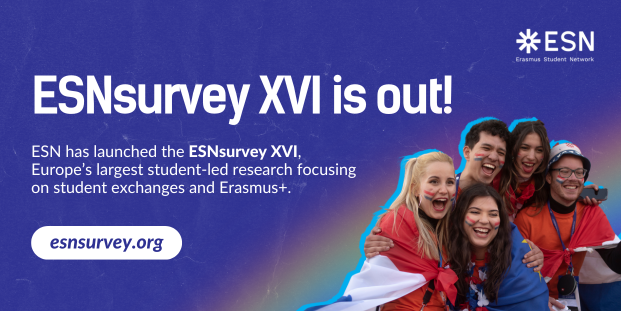ESNsurvey is now collecting answers!
Europe's largest student-led survey focusing on student exchanges and Erasmus+.
What is ESNsurvey?
The ESNsurvey is a Europe-wide research project covering different topics concerning mobility and education. It is the largest project of its kind, carried out independently by student representatives. The survey seeks to monitor the implementation of mobility programmes and the experience of international learners abroad, as well as the perceptions of students who have not participated in international student mobility yet.
Its first edition was launched in 2005, and thirteen more editions have been published since. The ESNsurvey has become one of the most relevant research publications in the field of student mobilities and the Erasmus+ programme, and over the 20 years of its existence, ESNsurveys have gathered more than 200,000 responses.
About Edition XVI
The new edition will focus on the “Future of International Student Mobility", as it will help prepare for the future Erasmus+ programme and collect students’ opinions on the current state of International Higher Education in Europe and beyond.
Edition XVI of the ESNsurvey is open from the 12th of May until the 31st of July 2025, and it targets students who have participated in exchange programmes or mobilities abroad during the last two years, full degree international students, as well as students who have not taken part in mobility yet. New this year is a track for graduates with a mobility experience!
Who can fill in the survey?
- Mobile Students who took part in an exchange in the past 2 years;
- International Full-Degree students from the past 2 years;
- Non-Mobile students who have not been abroad;
- Graduates who took part in an exchange more than 2 years ago.
Win Prizes
This edition of the survey comes with strong incentives from partners committed to sustainable and accessible mobility. Are you one of the target groups? Fill in the survey before the 31st of July 2025 and leave your contact details to participate in the prize draw! All data will be anonymised.
Prizes are the following:
- 1 of 5 Interrail Global Passes;
- A 2-night stay in a Meininger Hotel;
- Or 1 of 2 Ryanair vouchers worth €50.
Make your voice count, fill out the survey now on esnsurvey.org!
News and Publications
Stay updated with the newest edition of Europe's largest student-led survey focusing on student exchanges and Erasmus+, from launch to results.
Previous research reports
-
ESNsurvey 2021 - Understanding the Experience & Needs of Exchange Students in Challenging Times
-
ESNsurvey 2019 - Active citizenship and student exchange in light of the European elections
-
ESNsurvey 2018: Mapping the challenges and enablers of mobility for students with disabilities
-
ESNsurvey 2016: The International-Friendliness of Universities
-
ESNsurvey 2014: International Experience and Language Learning
-
ESNsurvey 2005: The Experience of Studying Abroad for Exchange Students In Europe



Follow ESN